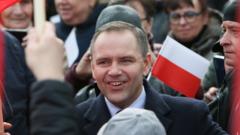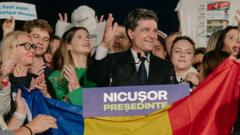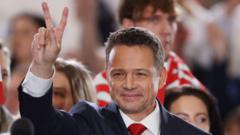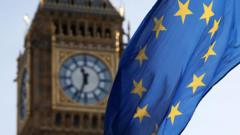Nawrocki, who is backed by the right-wing Law and Justice party, donned a disguise and blurred his face while praising himself on television, leading to widespread ridicule on social media as the election approaches.
Polish Presidential Candidate Faces Backlash Over Disguised Book Promotion

Polish Presidential Candidate Faces Backlash Over Disguised Book Promotion
Karol Nawrocki, a contender in Poland's presidential race, has been mocked after revealing he used a disguise to promote his own book, written under a pseudonym.
As a historian with ties to organized crime, Nawrocki's actions have raised eyebrows amid a contentious political climate, with the upcoming election holding significant implications for both local and international affairs.
In a bizarre twist of political fate, Polish presidential hopeful Karol Nawrocki has found himself at the center of a storm of ridicule after it surfaced that he once disguised himself to promote his own book. The book, penned under the pseudonym Tadeusz Batyr, chronicles the life of a gangster from Poland’s communist era. The revelation has prompted a flurry of mocking commentary on social media, as many question whether Nawrocki or his alter-ego will dominate the upcoming election.
During a television appearance in 2018 as Tadeusz Batyr, Nawrocki offered effusive praise of his own work while disguised in a hat and obscured face, stating, "This historian [Karol Nawrocki] actually really inspired me." Adding to the embarrassment, a social media post from Nawrocki cited a fictional meeting with Batyr where he recounted providing the author with insights into his research on organized crime.
Despite the backlash, Nawrocki approached the controversy with an unusual level of nonchalance, asserting, "Literary pseudonyms are nothing new in Polish academia." He further proclaimed himself the sole historian with the audacity to study organized crime in Poland, although admitting that Tadeusz Batyr lacked credible academic sources.
According to reports from Polish Newsweek, Nawrocki’s fascination with organized crime is widely known, with claims he associates with several figures linked to this underworld. However, Nawrocki insists that these relationships are entirely professional.
In the current presidential race, Nawrocki is trailing behind Warsaw mayor Rafal Trzaskowski from the liberal Civic Coalition party, while far-right candidate Slawomir Mentzen also garners attention with his anti-immigration and tax reform proposals. The implications of this election extend beyond domestic policies; Poland's role as a key ally in the West's support for Ukraine adds significant weight to the upcoming vote.
Nawrocki's party has openly criticized the European Union, associating its decisions with the ongoing conflict in Ukraine. Political analyst Marcin Zaborowski noted the election's importance, highlighting Trzaskowski as the sole pro-European candidate, thus posing a vital choice for the nation’s foreign policy direction.
For domestic voters, the stakes are equally high. The current government, led by Donald Tusk, has made promises regarding progress on abortion rights, same-sex marriage, and rule of law reforms. However, recent vetoes from President Andrzej Duda, aligned with PiS, have stalled such changes.
With both the national and international ramifications of the election looming, Nawrocki intensively campaigns to separate his identity from the laughter elicited by his alter-ego, Tadeusz Batyr. With less than two months until voters hit the polls, the political landscape remains charged and uncertain, making every campaign moment matter in a race that could reshape Poland's future.
In a bizarre twist of political fate, Polish presidential hopeful Karol Nawrocki has found himself at the center of a storm of ridicule after it surfaced that he once disguised himself to promote his own book. The book, penned under the pseudonym Tadeusz Batyr, chronicles the life of a gangster from Poland’s communist era. The revelation has prompted a flurry of mocking commentary on social media, as many question whether Nawrocki or his alter-ego will dominate the upcoming election.
During a television appearance in 2018 as Tadeusz Batyr, Nawrocki offered effusive praise of his own work while disguised in a hat and obscured face, stating, "This historian [Karol Nawrocki] actually really inspired me." Adding to the embarrassment, a social media post from Nawrocki cited a fictional meeting with Batyr where he recounted providing the author with insights into his research on organized crime.
Despite the backlash, Nawrocki approached the controversy with an unusual level of nonchalance, asserting, "Literary pseudonyms are nothing new in Polish academia." He further proclaimed himself the sole historian with the audacity to study organized crime in Poland, although admitting that Tadeusz Batyr lacked credible academic sources.
According to reports from Polish Newsweek, Nawrocki’s fascination with organized crime is widely known, with claims he associates with several figures linked to this underworld. However, Nawrocki insists that these relationships are entirely professional.
In the current presidential race, Nawrocki is trailing behind Warsaw mayor Rafal Trzaskowski from the liberal Civic Coalition party, while far-right candidate Slawomir Mentzen also garners attention with his anti-immigration and tax reform proposals. The implications of this election extend beyond domestic policies; Poland's role as a key ally in the West's support for Ukraine adds significant weight to the upcoming vote.
Nawrocki's party has openly criticized the European Union, associating its decisions with the ongoing conflict in Ukraine. Political analyst Marcin Zaborowski noted the election's importance, highlighting Trzaskowski as the sole pro-European candidate, thus posing a vital choice for the nation’s foreign policy direction.
For domestic voters, the stakes are equally high. The current government, led by Donald Tusk, has made promises regarding progress on abortion rights, same-sex marriage, and rule of law reforms. However, recent vetoes from President Andrzej Duda, aligned with PiS, have stalled such changes.
With both the national and international ramifications of the election looming, Nawrocki intensively campaigns to separate his identity from the laughter elicited by his alter-ego, Tadeusz Batyr. With less than two months until voters hit the polls, the political landscape remains charged and uncertain, making every campaign moment matter in a race that could reshape Poland's future.




















